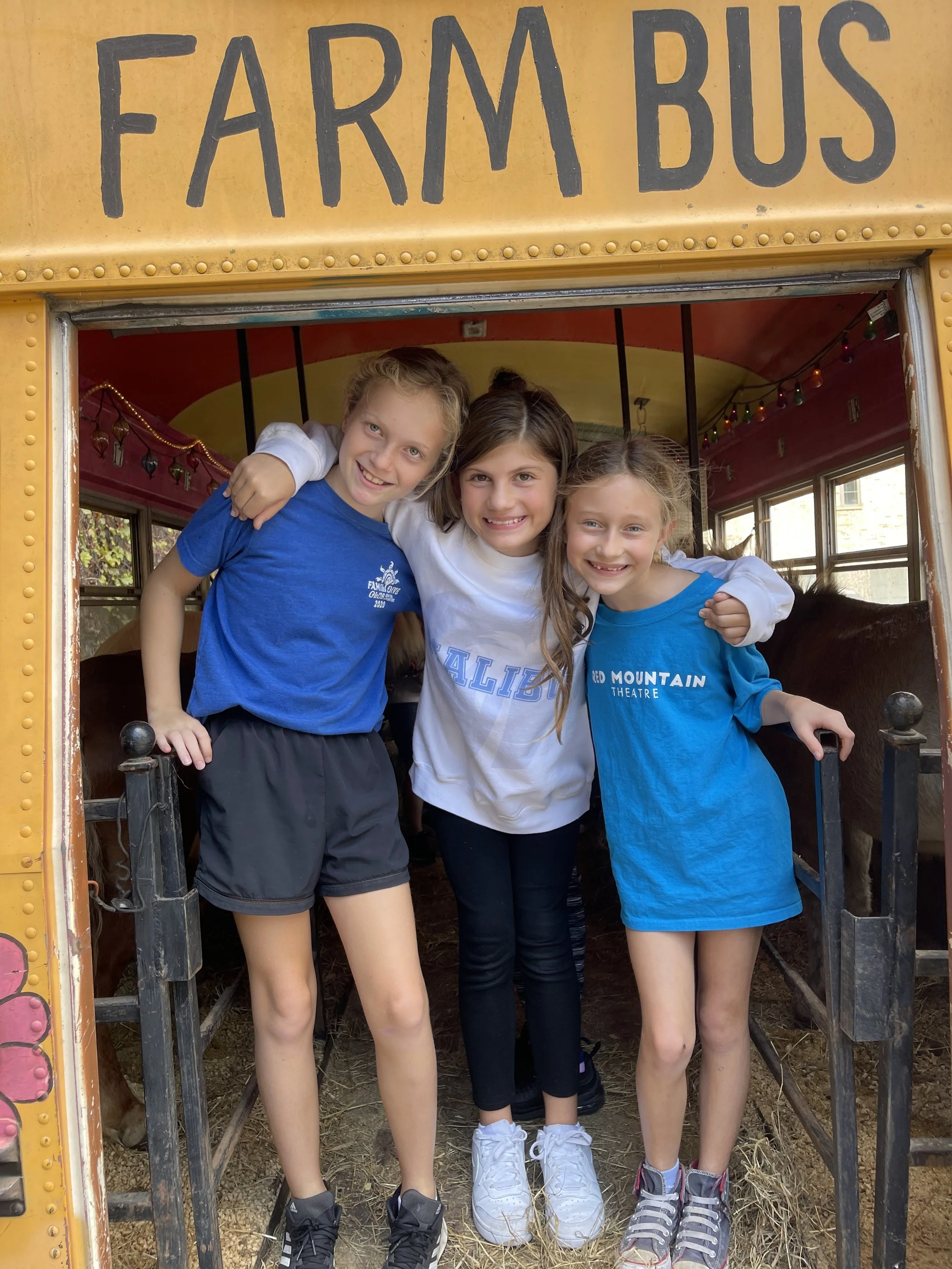
Late Elementary
Late Elementary Students Mature Into Dynamic, Confident Individuals.
4th & 5th Grade
Late Elementary is a crucial stage of development. They are working through complex problems on their own. Your child is becoming more aware of the world beyond their own personal sphere of experience as well as the skills and traits that make them unique. The beliefs – about themselves and the outside world – that they develop during this period will become a core pillar of their identity as an individual.
Our Curriculum
Fourth Grade
4th graders are industrious, curious, and serious about fairness and justice, characteristics we encourage and cultivate.
-
Fourth grade students begin to attend to their own thinking in responding to reading and writing. Various reading strategies and extensive revision in writing encourage students to reflect on their processes in these areas. Students compose informational and creative texts while developing a single idea or theme across multiple paragraphs. Fourth graders read appropriately challenging texts and learn strategies for deeper comprehension while also being introduced to analytical approaches to stories. In fourth grade, students complete their first comprehensive research paper.
-
Fourth grade students master multi-digit multiplication and division as they learn to solve different types of problems using a variety of strategies and approaches. Students develop a deeper understanding of fractions and geometry which helps to build knowledge of real world problems. Students also strengthen their knowledge and skills of place value, geometry, and measurement and apply these skills to solving problems.
-
Students dive into the history of our great state of Alabama. Starting from the earliest Native American territories and soaring through to present day government, the students learn about all of the discoveries and lengths it took to form our state as well as establish a functioning governmental system. From the Civil War, to the Great Depression, through the Civil Rights Movement, and to present day government, the students have a deeper understanding of where they are from and all of the history that surrounds them each day.
-
Students focus on elements of Earth Science, Physical Science, and Biology. Students learn and gain a deeper understanding of natural resources, landforms, force, energy, wave properties, light, information processing, structure and function of organisms, and the solar system.
-
Fourth grade French continues the trajectory set in third grade. All aspects of world language acquisition are included: speaking, writing, and understanding spoken French. Students learn how to write numbers 0-100, the dates, the days of the week, the months, the seasons, the weather, holidays, sports, and family members. Cultural icons such as Tintin, Astérix, and Obélix are introduced.
-
Fourth graders begin to learn the recorder, the structure of larger musical works, transposition of simple melodies from treble to bass clef, musical keys up to four sharps and flats, musical intervals and their qualities, and compound time signatures.
-
Students in fourth grade continue to develop their abilities to create independent work by developing unique responses to thematic prompts using the steps of the design process. Students expand their drawing skills by practicing observational drawing and working to develop a wider range of shading techniques. Students also practice creating the illusion of three dimensional space in drawings by using the foreground, middle ground and background of the picture plane. Students work with hand building techniques to create functional and expressive objects in clay.
Fifth Grade
5th graders start thinking about issues from multiple perspectives, begin developing an independent self-image, and love to gather and classify facts.
-
Fifth grade students write short analytical pieces to demonstrate understanding of their reading while producing longer compositions in creative genres. Long term writing projects in 5th grade include memoir, fiction, and poetry; writing is supported by the reading of mentor texts in each genre. Fifth grade students learn frameworks for better understanding of both fiction and non-fiction texts; by recognizing certain deep textual features, students are able to develop thoughtful questions that lead to more complex analysis of their reading. In addition, fifth graders engage in a significant amount of independent reading to continue building confident and consistent readers with strong reading identities. Reading and writing is supported by vocabulary instruction focused on classic Latin and Greek roots and by grammar instruction to improve syntax.
-
Fifth grade math begins the study of higher level math concepts and thinking. Utilizing a traditionally sixth grade course (Course I), students dive deeper into the concepts of number operations, properties, data, fractions, and functions.This course is an important foundation in higher level math thinking.
-
Fifth grade science is based on a series of STEM missions. These missions consist of Life Science, Physical Science, and Earth Science.The students work through each mission, and then review their findings. In the spring, students complete a twelve week project studying the photo periods of ten mystery locations around the world.This helps the students to understand seasons, the rotation of the earth around the sun, and learn about new cultures around the world.
-
Fifth grade social studies focuses specifically on American history with an emphasis on the Constitution of 1787. Students discuss current national and global events in tandem with their study of American history in order to further develop their understanding of living history. Fifth grade social studies builds on many of the ideas and events that have been covered in the Lower School such that students begin to put together the historical pieces they have learned into a cohesive whole.
-
Fifth grade French focuses on speaking development. During the first semester, students learn and produce a play about the morning of the first day of school in the life of a family. Students focus on learning vocabulary around commands, breakfast, clothing, and furniture. Additionally through the continued lens of the first day of school, students learn the names of French accent marks, the vocabulary of school subjects, the content of a backpack, classroom commands, interrogative words, and some question forms. The second semester introduces a study of French culture and expands students’ French vocabulary and understanding of more complex interrogative words. Students learn how to express what they know how to do, likes and dislikes, and an introduction to telling time.
-
Fifth grade students learn irregular time signatures, all major and minor key signatures, all musical intervals, chord qualities, and basic cadences as well as expanding upon musical forms.
-
Fifth grade students incorporate the elements of art (line, shape, color, texture, value, space and form) in their creations. Instruction focuses on major art making processes of drawing, painting, collage, printmaking, photography and ceramics. Students continue to use a sketchbook and/or sketching activities to develop and reflect on their art creations.
-
Students learn the basic of participation in and leadership of a brief service of worship from the Book of Common Prayer. Students learn to identify the seasons of the liturgical year. Students also learn about specific feasts and fasts of the liturgical year and their significance.
Our Flex Period
As our students mature, we recognize that making choices and developing independence are important developmental milestones. Flex period allows students to make monthly choices to enhance, support, and/or explore new areas of interest within the academic curriculum.
Each teacher leads a flex period session. These sessions include academic support, enrichment, additional project time, and club meeting times. Students work with their homeroom teacher to develop an individual monthly schedule for their flex time.
Flex period is built into all 4th- to 8th-grade student schedules. It occurs on Mondays, Tuesdays, and Thursdays each week.
For example, a student flex schedule for the first quarter of school may include:
| Monday | Tuesday | Thursday | |
|---|---|---|---|
| Main Support | Writing Enrichment | French Help |
Flex options change throughout the year, and students are able to sign up for new sessions each month. Their flex schedule is determined through student interests and needs in addition to teacher and parent input.
Our Navigation Course
Advent’s Navigation course is designed to provide an opportunity for students in grades 5—7 to learn and practice critical life skills for success in and out of the classroom. Each unit of study is broken into 9-week segments (matching the academic quarters). Classes meet once a week during this time and are taught by homeroom teachers and leadership team staff.
Units of Focus:
Study Skills — Study skills will focus on developing strong organizational practices, note-taking skills, helpful technological tools, and time management skills, etc.
Financial Literacy — Financial literacy will focus on developing skills like money management, savings and investing, credit and debit, wages and salaries, and personal budgets.
Public Speaking — Students will develop an appreciation for strong public speaking skills and will learn techniques to improve their own ability to speak in front of a variety of audiences.
Nutritional Well Being — This unit will focus on the connection between physical, mental, and emotional well-being. Students will learn to read food labels, will explore the importance of balance, and will learn to evaluate their own healthy habits.
Field Trips
We’ve established field trips as an integral part of our curriculum to allow students to experience learning in real-life settings. Understanding more about the world (and city and state!) around them empowers our students to more deeply understand and apply the concepts they are learning about in the classroom. Our location in the heart of downtown plays a critical role in our ability to expose students in a safe but meaningful way to the amazing resources we have right at our doorstep.
-
Camp McDowell Farm School
Children’s Theatre
Birmingham City Library Archives
US Space and Rocket Center
Historical Downtown Birmingham Walking Tour
Capital Tours in Montgomery -
Washington, D.C.
BJCC Chamber Theatre Productions
Birmingham Civil Rights Institute
Oak Mountain State Park


